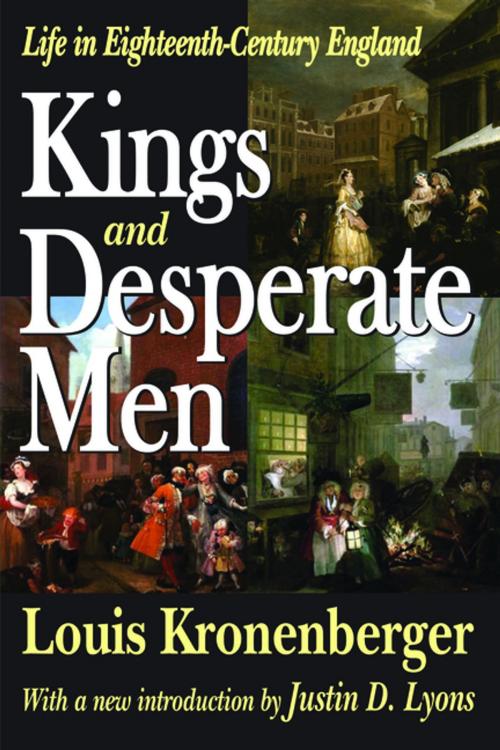| Author: | Louis Kronenberger | ISBN: | 9781351510127 |
| Publisher: | Taylor and Francis | Publication: | July 5, 2017 |
| Imprint: | Routledge | Language: | English |
| Author: | Louis Kronenberger |
| ISBN: | 9781351510127 |
| Publisher: | Taylor and Francis |
| Publication: | July 5, 2017 |
| Imprint: | Routledge |
| Language: | English |
The goal of Kings and Desperate Men is to provide a picture of eighteenth-century England up to the French Revolution. Kronenberger's work lies much closer to a social chronicle than an orthodox history, and is more concerned with manners and tastes than with treaties and wars. Kings and Desperate Men reveals what life was like for both aristocrats and commoners: their family lives, experience of larger society, habits, diet, fashions, religion, and artistic tastes. In tracing these topics for both city and country dwellers, he artfully communicates the very real division between the vivacity of London and the regular, fixed, and monotonous character of country life. The division is vital to understanding the age and the transformations it would experience.Yet Kronenberger does not ignore the more traditional historical landmarks. Kroenberger treats the characters of the leading political actors: Walpole, Bolingbroke, Burke, Fox, and Pitt, while providing the reader with a sweeping account of the formation of political parties and constitutional shifts of power between the monarchy and parliament. Students of the period who despair at its political complexities will fi nd much to appreciate in Kronenberger's condensed and easy to understand formulations.As for philosophy, Kronenberger refers to thinkers and ideas as they influence English life; especially Locke and Hume. Their ideas and reputations are explained as part of the character of society. The same is true for economics. More attention is given to the social gains of middle-class shopkeepers and the eighteenth-century zeal for stock speculation than to formal schools of thought. Especially notable is Kronenberger's treatment of both the arts and the artists of the eighteenth century-theatre, opera, music, literature, architecture, and painting.
The goal of Kings and Desperate Men is to provide a picture of eighteenth-century England up to the French Revolution. Kronenberger's work lies much closer to a social chronicle than an orthodox history, and is more concerned with manners and tastes than with treaties and wars. Kings and Desperate Men reveals what life was like for both aristocrats and commoners: their family lives, experience of larger society, habits, diet, fashions, religion, and artistic tastes. In tracing these topics for both city and country dwellers, he artfully communicates the very real division between the vivacity of London and the regular, fixed, and monotonous character of country life. The division is vital to understanding the age and the transformations it would experience.Yet Kronenberger does not ignore the more traditional historical landmarks. Kroenberger treats the characters of the leading political actors: Walpole, Bolingbroke, Burke, Fox, and Pitt, while providing the reader with a sweeping account of the formation of political parties and constitutional shifts of power between the monarchy and parliament. Students of the period who despair at its political complexities will fi nd much to appreciate in Kronenberger's condensed and easy to understand formulations.As for philosophy, Kronenberger refers to thinkers and ideas as they influence English life; especially Locke and Hume. Their ideas and reputations are explained as part of the character of society. The same is true for economics. More attention is given to the social gains of middle-class shopkeepers and the eighteenth-century zeal for stock speculation than to formal schools of thought. Especially notable is Kronenberger's treatment of both the arts and the artists of the eighteenth century-theatre, opera, music, literature, architecture, and painting.















